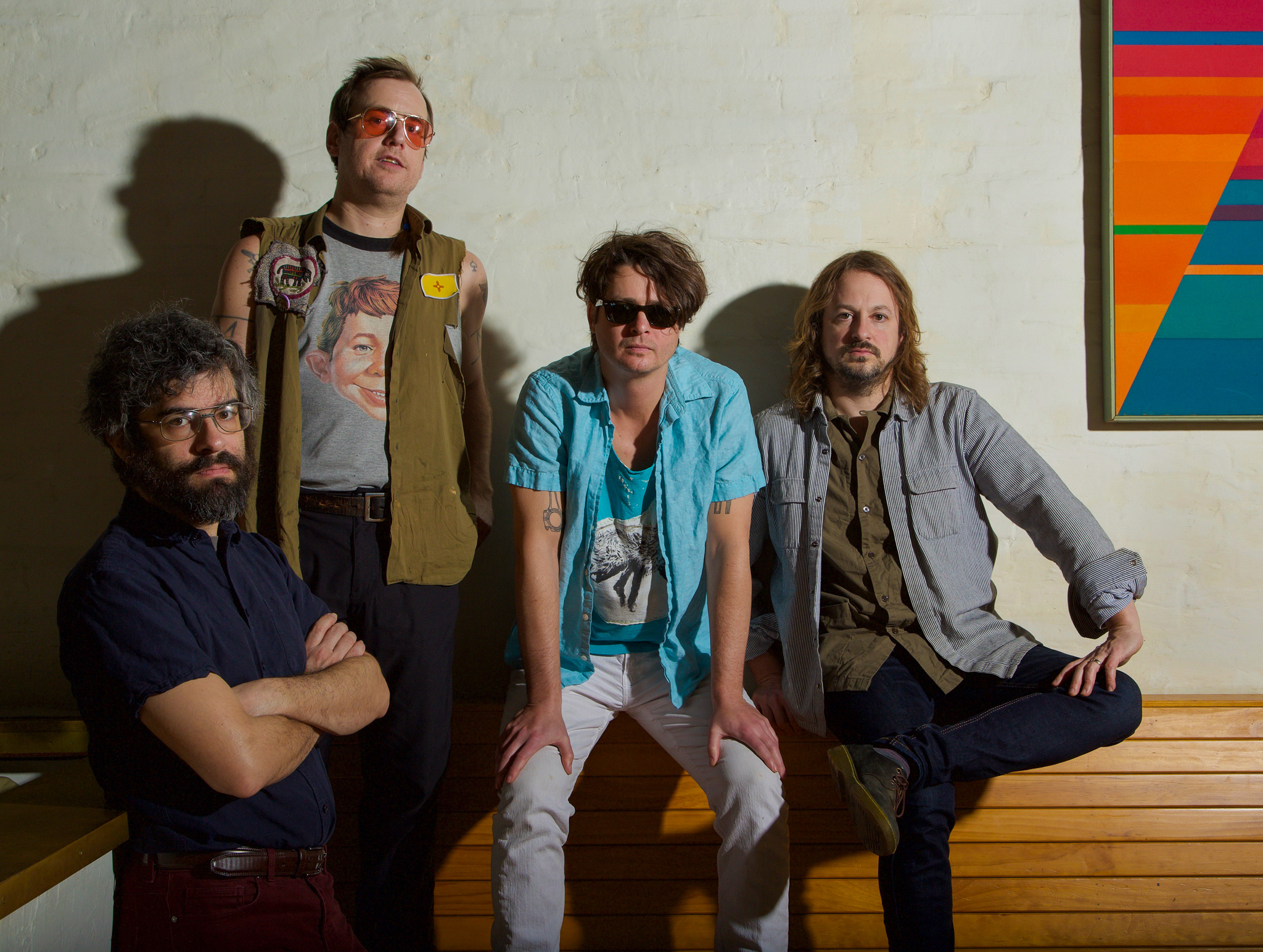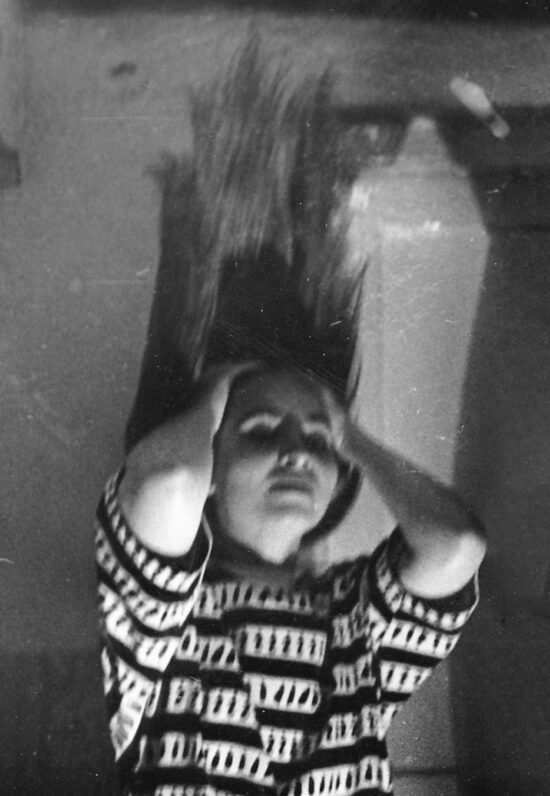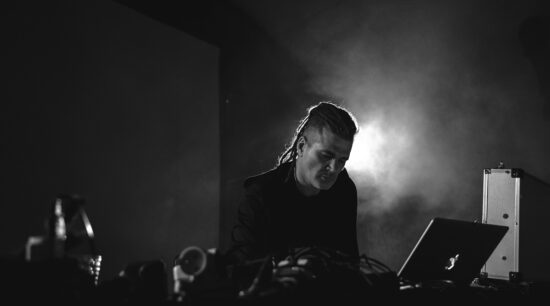“If we don’t attach that gravity to it, it’s meaningless and we refuse to contribute to the morass of abstraction within music. We use our music and our platform that we have in order to generate progress and further our conditions and beliefs as people, politically and otherwise.”
Translation: Aleksandra Szkudłapska
Sunwatchers are back. After II, the fantastic album they put out last year, the New York quartet is not slowing down one bit and has just released another record: Illegal Moves. Apparently they have plenty more material – given the fact that last year they also made a live record and an album with Eugene Chadbourne, I find that easy to believe.
Yet Sunwatchers are not just prolific. Their music is all about being inspired by a number of traditions: the musicians, who grew up in the punk rock and DIY ethos, reach for jazz (with their own rendition of an Alice Coltrane track on Illegal Moves), minimalism, blues, even Thai and Lao music, which is where Jim McHugh’s electric phin guitar comes from (McHugh furthers his interest in Molam music in the amazing Drunken Foreigner Band).
On Illegal Moves, all these influences conflate in a killer combo: extremely expressive, evocative, and more coherent than the previous album. Sunwatchers are also, or above all, interested in the here and now, commenting on the world around them and engaging in current social and political affairs –by taking part in public protests, donating the proceeds from their records to NGOs, and the rather outspoken album covers. While the visual layout of II was beautifully simple and spot on, the cover of Illegal Moves takes a jibe at the political and cultural establishment of today’s USA, easily being one of the most radical record covers of the last couple of years.
Sunwatchers are a unique band, whose music makes a poignant reference to topical problems, because – according to their guitar player – they just don’t see it any other way. To them, music cannot exist as an abstract entity or mere entertainment, but solely as active reaction and a commentary rooted in the everyday.
Jakub Knera: Please choose the first question: I can ask you about the electric phin guitar you play, the cover of the new Sunwatchers album or the political aspect of your music.
James McHugh: The album cover sort of depicts our political beliefs, so we can start with this. I came up with the idea while on an airplane. I was reading Post-Scarcity Anarchism by Murray Bookchin for the first time in about 10 years. It’s a highly radicalizing, definitive book about modern anarchism – his ideas and approach are and were hugely influential on me while I was growing up. I also had a copy of Mad Magazine, which I hadn’t read in about 20 years – it’s a magazine that was made for kids in the 1960s and it’s still around. There are cartoons in it and humor writings – a lot of it was really subversive, almost every kid that I knew read it. I was re-reading both of them and then the idea for our album cover popped into my head like a lightbulb. The cartoon style that’s on the album cover is directly inspired by a specific artist who worked for Mad Magazine – I had the idea of a highly radicalized, leftist, anticapitalistic propaganda made in a cartoon, Mad Magazine style. The artist Scott Lenhardt did our first album cover and he loved the idea – he really made it a lot more amazing that I even envisioned.

I like the cover of your second album – it was really moving, and this one seems to be a step forward. It’s much bigger.
Thank you. The album cover for II was made by our really good friend Catherine Wheeler when she was travelling across Africa by bus. She presented it to us as a surprise – it was so beautiful and amazing that we just knew it had to be our cover.
Our political interests, beliefs, convictions and involvements came around before the current regime in our country. With the last album we really felt – because things were getting so extremely and overtly racist and fascistic – that we had to be overt with what we believe in.
If we don’t attach that gravity to it, it’s meaningless and we refuse to contribute to the morass of abstraction within music – we don’t dedicate our lives to just merely be entertainers for wealthy people. We use our music and our platform that we have in order to generate progress and further our conditions and beliefs as people, politically and otherwise.
Then you developed the idea of the cover on Illegal Moves.
It’s an extension of our beliefs, but it also combines our sense of humor – we are really goofy guys. We wanted a mixture of an overtly political album cover, because it’s really extreme in a way, but also our sense of play.
This political and social engagement is a huge part of Sunwatchers. Do you remember when it all began? Was it a part of your life before you started playing music or did both things happen simultaneously?
Absolutely simultaneously. When I was a teenager, I grew up in a really small town in the south of the US, in North Carolina. When I discovered punk rock, it changed my life. I regard my discovery of punk rock as the beginning of me as an adult and my own person. In transit to that discovery was how intertwined and absolutely inseparable leftist politics from punk rock is. I started going to punk shows as a 15-, 16-year-old person, getting information about going to marches, political movements that were not necessarily in the foreground of American politics, because they’re progressive and somewhat extreme with regard to the way people think about politics on the mainstream level. I started feeling empowered to play music the same time. Punk rock encourages do-it-yourself and teach-yourself music – I’m self-taught as a musician. It all happened at the same time. It was me discovering music that really inspired me and gave me the idea that they were other things outside of my reality in this small town in the south of North Carolina. I started playing music and going to marches: anti-police brutality marches, leftist marches and meetings, Food Not Bombs, stuff like that. It all happened at the same time, which was 25 years ago. And I can say similar things about other people in Sunwatchers. With punk rock and underground music came the awareness of leftist politics. One thing that I mourn in American life is the separation of that. In my opinion, in Sunwatchers’ opinion, underground music, culture and art should be inseparable from progressive political thought. Anti-capitalist thought should be forever married to underground art.
Most punk rock bands or politically involved bands have a singer to convey that message, but Sunwatchers’ music is strictly instrumental. How do you see yourself in that role?
That is a really interesting and valid question – that’s why we are really overt with our album covers. We also travel around with information that we put on our table where we sell merch and records after concerts. We have free pamphlets and books about political movements that we believe in. We have a group that we organize under: Music Against Mass Incarceration. We organize prison abolitionist benefits and anti-prison, anti-capitalist benefits under this organization.
The lack of vocalist or a mouthpiece per se has made us pursue more direct ways of expressing our political beliefs. If you have a singer singing about whatever’s happening in Africa or Venezuela and it stops there, what’s the fucking use? You have to take another step: spreading information is highly important and valuable, but at this point you need to take a step further and make things happen in the ways that you can.
Here it would be apt to mention that the proceeds from your first album went to the Human Rights Coalition and you’re donating the proceeds from II to JustLeadershipUSA. Are you also going to do it with Illegal Moves?
We’re thinking the proceeds from that one will be going to the Sylvia Rivera Law Project. They are a really fascinating, grassroots progressive group. We had a benefit show with Music Against Mass Incarceration at the end of February with them speaking, and proceeds from that show went to them as well.
I can hear this engagement throughout the music as well – Sunwatchers brings to my mind Albert Ayler’s music, but also punk music, prog, or even blues.
We’re actually named after an Albert Ayler song. And the way they were involved… We made a record with Arthur Doyle and I’ll just speak about what I know from talking about this with him, because this is direct. Arthur Doyle just wanted to be a musician – his vision of music was very extreme, amazing and beautiful. He was pushed into political involvement because he was a progressive black man, simply a black man from Alabama. He had no choice but to be engaged politically, because he was being harassed and haunted on a daily level. It’s not something he wanted, it’s something he had to deal with. He had to face it straight on and the music he made became more extreme as a result of the anger, the rage, but also the transcendence and the seeking of beauty in a life that’s fraught with that sort of harassment.
That’s why I feel that people like Doyle, Ayler, Pharoah Sanders and Alice Coltrane made music that’s inherently political because of their position as progressive thinking people of color in this country. It’s the same with blues people. By the way check out the book Blues People – it’s amazing. They were inherently politically involved because they were people of color trying to survive in a directly, systemically racist system. That’s where the anger, the sadness, and the rage comes from.
Punk music is different, because it’s largely made by white people. There’s a level of divide between direct oppression and most middle-class white people – like myself – who make punk music. That’s a choice they make. Arthur Doyle was making angry music because he was sort of driven to it. We had the privilege of playing with him, so we soaked up that rage – and we’re angry people because of what’s going on – but I feel that’s where our political engagement musically comes from. We’re making hyper-direct underground music that’s not for anybody but alienated people who are driven into another scene by their ostracized nature and alienation from mainstream American culture which is all about consumption. Our music is made for people with this sense of rage that we have and we sense as conscious, aware people in this country and in this world right now. We hope to translate the rage of the alienated and the oppressed – we’re working class people, so we are a part of that.
You mentioned the current regime in the US, but this kind of political context is quite common in many countries in the world right now. Do you think this situation makes it easier to make socially engaged art?
I think that’s kind of an abstract question. No matter who’s been president of the United States for the last 100 years, it’s been a systemic, racist system of oppression and exploitation based on consumption. The mindset inherent in the propagation of capitalism is one of exploitation, frustration and alienation. Until we get rid of that it doesn’t matter who’s president – it could be the fat fucking fascist clown that we have now, or it could be Obama who deported more people than anybody in history and conducted a forever war in the Middle East. Now things are really bad here – people are committing suicide, overdosing left and right, people on the street are going to prison. Those things are way more important than an atmosphere conducive to making angry music. I would easily give up the last 50 songs I’ve written to make this world a better place. The progress that we make as humans in caring for each other and helping each other to survive is the most important thing we are facing right now.
You’ve told me about the ideas for your albums covers. What was the idea behind the music on Illegal Moves? For me, it sounds more coherent and less raw than II.
It took us a while to make it, and because there’s three songwriters in Sunwatchers, we generate a lot of material. We’re already finishing another album – that’s how we work. For II we were just generating new material, recording it and then we released it – what can explain the lack of coherence, I agree with you. The album feels more like individual statements. For Illegal Moves we recorded a lot of material and had the luxury to spend some time and pick out a lot of different stuff – so that it’s more like one overarching statement. One of the reasons is in the autumn we made a record with Eugene Chadbourne and the way he works is very inspirational to me. He does whatever he wants, his engagement as a performer and improviser is so immediate and contemporaneous with whatever is going on at the moment. I wanted to be less exacting, I just wanted to crank stuff out. We were less precious about Illegal Moves – we had the material and thought “let’s get it down, this is the new song.” We didn’t have to spend a lot of time doing it – given that we had a lot of stuff to choose from made at the same period of time, we could put it together in a way that made it fit.
There’s also an Alice Coltrane song on the record.
We consciously did that to place us within a jazz tradition of playing other people’s music.
Her music should be a national standard or even our national anthem.
We consciously did that to put us in this tradition – maybe that contributes to the way it fits together.

Since you’ve already mentioned tradition – that’s another interesting topic in your music. There’s the jazz tradition, punk tradition, blues tradition, but also minimalist tradition. Sunwatchers seems to be a punk band that’s very much rooted in all those different worlds.
Our saxophone and keyboard player Jeff Tobias is a very beautiful instrumentalist. He’s the polar opposite to the composers in the band. And you know, my favorite guitar players are Mississippi Fred McDowell, Pete Cosey and Sonny Sharrock – these blues and jazz tradition guys. But then you listen to it and you’re like ”whoa, he’s only played one chord for the past 30 minutes.”
What’s more minimalist than that and what’s more punk rock than that in terms just doing whatever you want? All of those things are linked in that way: beautiful and simple music that’s just so to the point and amazing. Jeff’s ideas sound like they’re from Terry Riley or Steve Reich and then I’m just like “oh, that’s cool, I can just play this one chord that I figured out from listening to Fred McDowell for the last 6 hours.”
It all fits so perfectly together in that way – jazz and sax playing particularly is really redolent of this cyclical, circular playing of Philip Glass’s keyboards. Sonny Sharrock said one thing years ago: the most progress innovations made on an instrument are made in attempts to imitate other instruments. I find a lot of truth and inspiration in that. Sharrock wanted to play saxophone, but he had asthma, so he had to play guitar – but he wanted to play it as if it was saxophone. He said, “I don’t play guitar, man, I’m just a saxophonist with a fucked-up axe.” I found a lot of inspiration in that and Jeff does too – he likes to play his saxophone the way Terry Riley plays keyboards.
We’re going for an independent doing-whatever-we-want, and it ends up fitting in the traditions of music we listen to obsessively and love. We’re not trying necessarily to play punk rock on the guitar. Jeff is trying to play American minimalist traditional music on a saxophone, I’m trying to play like Mississippi Fred McDowell through my huge stupid amps and my electric guitar as opposed to a resonating acoustic guitar.
In terms of releases, you’ve got quite an impressive track record – in just one year, you’ve released 4 albums: II, your live album, the album with Eugene Chadbourne –3 Characters, and now Illegal Moves. What’s the story behind your collaboration with Chadbourne?
Another thing about my growing up in North Carolina was the fact that me, Eugene and actually Henry Flynt are from the same town. As a musician and as a young person I had the immense luck of growing up seeing Eugene play very often. You’d see him going down the street, and he’d be like “Hi, I’m playing in a record store for free with this guy that I’m going on tour with.” You’d go there and it’d be Han Bennink, Paul Lovens or Jimmy Carl Black. He was bringing them to my small hometown to play for free in a record store. It couldn’t have been more influential on my sense of the music that I wanted to play. On top of that they were playing songs like The Byrds, Albert Ayler or Ornette Coleman songs. That’s a huge influence on us in terms of doing whatever you want as long as you do it with all your guts. That’s how Eugene did it. I’ve known him since I was a teenager.
How did your collaboration come about?
He used to play in my DIY punk space in Greensboro, North Carolina, but we got back in touch when he played a show in Brooklyn. Back when I lived in Georgia, I had a band called Dark Meat – we used to do Albert Ayler songs. One time I brought the Swedish filmmaker Kasper Collin, who made the My Name Is Albert Ayler documentary, to Athens for a screening. We really wanted Eugene to come play. We couldn’t raise enough money, but we stayed in touch. Later I was helping him get shows in New York and we had a two-day gap between shows, so I booked some studio time and we went in there to records something. While we were there, he’d just suggest we do some Minuteman songs – and so we did, without any rehearsals. Later he said the same about Doug Sahm or Henry Flynt songs. That’s what that record is, and Eugene’s sense of coherence is that he can create this overarching concept album. He’s so instantaneous and so in the moment. His ability as an improviser, his engagement in the material is hugely influential on us.
Now it’s time to finally ask you about your electric phin guitar from Thailand. How did you start playing this instrument?
I connected with a band from the Isan region of northern Thailand and Southern Laos named Khun Narin. They put me in touch with the person who makes their instruments and I bought two. In the process of learning Thai music with Drunken Foreigner Band, Jeff and I started developing the idea of playing it in a different context and that’s how we started writing songs in that way. I play it in about 30% of Sunwatchers stuff and I also play saz, an instrument from Turkey, especially in the Alice Coltrane tune on our new record.
Drunken Foreigner Band is interesting concept of playing electrified version of the Akha and Lam Lao music of Thailand and Laos. We’ve talked about different traditions – how did you discover this one?
A good friend of mine, Dave Kadden, who sometimes plays with Sunwatchers, like on our new record, has made several trips to South-East Asia and collected cassette tapes of largely vocal music. He also plays an instrument from Thailand called the khene, which is a reed instrument you play with your mouth. He’s obsessed with that music and adopted a lot of the vocal music from cassette into this electric Velvet Underground-inspired rock music that we play. I started playing with them basically to learn playing the phin, but we eventually decided to record an album which was released by Electric Cowbell. This music is just amazing, and it’s got everything we love. It’s droning, over here, the melodies played would translated to what we call the blues scale. It’s super ancient and really beautiful. And we don’t write music, it’s all music that we’ve learned.
It’s directly part of a tradition and you’re not composing.
We’ve gotten hits from people that this is cultural appropriation, but the thing is, the way I feel about it is that music is a universal language. We’re not making any money from it, it’s not exploitation in the financial sense. When people who have pretentions to being leftist started telling me that I have to ask permission or there’s a limit to what I can express as an artist or what I can pay tribute to or what I can play…. I get my hackles up. These ideas of cultural segregation and censorship are much more in a way of a right-winger. We’re about freedom and a globalist notion of connection and what expresses that more than music being spread across the world?
The name of the band sounds a bit ironic.
We’re definitely pointing out the notion that we’re all American people and we’re making fun of that aspect of tourist culture that’s so repulsive in a lot of ways. The album is even called White Guy Disease. We’re definitely pointing it out, we’re not hiding anything.
We’ve not written this music. This is Molam music that we love, and I think we can play whatever the fuck we want. We’re also very conscious of the idea how this can be construed, so that’s why we’re ironic about it.
Funny how we’ve come full circle, and went back to the kind of social commentary from the very beginning of our conversation.
Exactly. However, making beautiful music from the other half of the world is why we live. The spreading of that information is also part of our role.
Illegal Moves is out now by Trouble in Mind Records.
Listen 🎶 Bandcamp 🎶 Spotify 🎶 Tidal 🎶 Apple Music.




